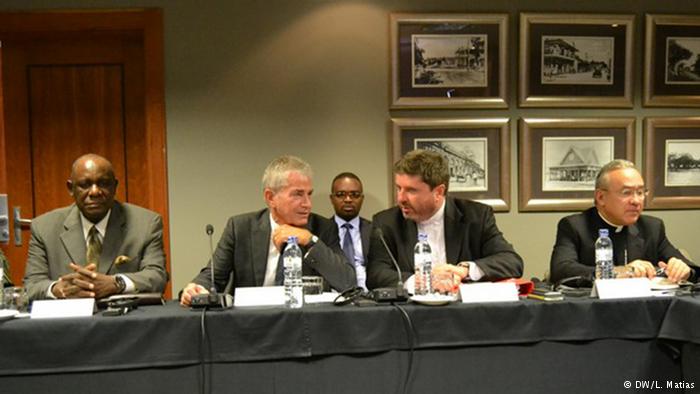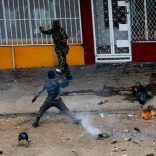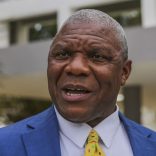Mozambique: Mondlane says that Public Prosecutor's Office wants to hold him responsible for the ...
Analyst predicts of difficult peace negotiations in Mozambique

DW (File photo) / Joint committee for the peace talks in Mozambique
In Mozambique, Renamo is still seeking redress for what it considers the failures of the 1992 Peace Agreement, and analyst João Pereira agrees that resolving old disputes will be essential to arriving at a permanent peace settlement.
According to Jacinto Veloso, head of the Frelimo delegation in the Joint Commission peace negotiations, the opposition Renamo party delegation was given the task of presenting a model to address deficiencies in the reintegration of its men in the Defence and Security Forces, the Police of the Republic of Mozambique and the Information and State Security Service.
DW Africa spoke with Mozambican political analyst Joao Pereira on this point, which has long caused deadlock in the dialogue .
DW Africa: It is valid at the moment for the peace talks to discuss possible irregularities in the 1992 General Peace Agreement, or should the perspective now be focused just on the future?
João Pereira (JP): I think both alternatives are valid. We often want to discuss the future without understanding the reasons for a conflict properly, and those reasons have a past. And on that basis it would be worthwhile to focus on the past a bit and see what did not work well in the 1992 Agreement, and then to see how past mistakes can be avoided in any new agreement, so that five or six years from now we are not coming back to negotiate another agreement.
DW Africa: The international mediators returned to the country last week. Before they left, they asked the parties to arrange for the opening of a demilitarised corridor so they could meet with RENAMO leader. Twenty-five days later, there seems to be no progress.

JP: It is natural that they want to talk to the Renamo leader. There are individuals mandated by the Renamo leader to represent the party at the negotiating table and decide on various things, but I think the mediators’ request is important as a way of boosting confidence between the parties and showing a certain respect for the Renamo leader.
We must understand that, as a party, Renamo is very centered on the figure of its leader. And, talking to its leader, the mediators may be able to convince the man to accept certain things which, through intermediaries, they would not be able to.
But there is another point, and that is the military dimension. Perhaps the government fears that creating this corridor would enable Renamo to move its forces rapidly from its central base in Gorongosa to other regions to acquire weaponry.
DW Africa: The Joint Commission is to hear a talk by an expert on administrative decentralisation this week. Do you think the main political forces have a similar perception of the concept?

JP: I think it is normal for different political forces to have different interests, so they are likely to have different perspectives on decentralisation. But there is also a common element in this process, and that is that everyone is talking about decentralisation. This means that everyone thinks that decentralisation may be something that can serve as a potential mitigation in the conflict potential in Mozambique.
But it is necessary that the whole issue is discussed coolly, because it is not just decentralising that will solve the country’s problems. You have to come to some conclusion as to what kind of decentralization you want, what mechanisms should be created, because if you act hurriedly, you may end up with a decentralization in conflict with existing laws.
Yes, we can decentralise, but will it be only political? Just the indication of governors, the issue of provincial assemblies, the relationship of the assemblies with governors? Then we have issue of income. Where will the municipalities’ revenue come from? How will compensation be made to municipalities, districts or provinces that cannot raise their own revenues to support the decisions taken?
All this discussion has to take place beforehand, or we are simply building atom bombs for future conflicts.
So I believe that we must find, first of all, the possibility of a ceasefire and go back to the ‘home work’ of profound reflection on the nature of decentralisation and what kind of reform we need, and set up an independent commission to monitor whether reforms are being made or not.
DW Africa: What do you expect from this mediation phase after the return of the international team?
JP: I think that the mediators have a role, but more than that, there needs to be political will on the part of Renamo and the government to reach agreement. If the action of the mediators were decisive, we would have already lasting peace in Mozambique. From what I see, this process will not be so simple. It will require many more rounds of negotiations to find a lasting peace in Mozambique.












Leave a Reply
Be the First to Comment!
You must be logged in to post a comment.
You must be logged in to post a comment.